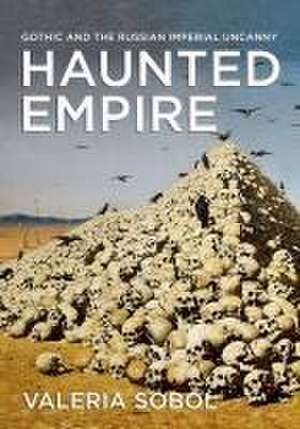Haunted Empire – Gothic and the Russian Imperial Uncanny: NIU Series in Slavic, East European, and Eurasian Studies
Autor Valeria Sobolen Limba Engleză Paperback – 14 oct 2023
| Toate formatele și edițiile | Preț | Express |
|---|---|---|
| Paperback (1) | 185.25 lei 3-5 săpt. | +13.26 lei 7-11 zile |
| MB – Cornell University Press – 14 oct 2023 | 185.25 lei 3-5 săpt. | +13.26 lei 7-11 zile |
| Hardback (1) | 719.26 lei 6-8 săpt. | |
| MB – Cornell University Press – 14 sep 2020 | 719.26 lei 6-8 săpt. |
Din seria NIU Series in Slavic, East European, and Eurasian Studies
-
 Preț: 138.18 lei
Preț: 138.18 lei -
 Preț: 89.68 lei
Preț: 89.68 lei -
 Preț: 197.11 lei
Preț: 197.11 lei -
 Preț: 185.88 lei
Preț: 185.88 lei -
 Preț: 239.52 lei
Preț: 239.52 lei -
 Preț: 214.65 lei
Preț: 214.65 lei - 19%
 Preț: 369.08 lei
Preț: 369.08 lei -
 Preț: 130.71 lei
Preț: 130.71 lei -
 Preț: 216.21 lei
Preț: 216.21 lei -
 Preț: 219.33 lei
Preț: 219.33 lei -
 Preț: 114.05 lei
Preț: 114.05 lei -
 Preț: 238.40 lei
Preț: 238.40 lei -
 Preț: 169.95 lei
Preț: 169.95 lei -
 Preț: 216.01 lei
Preț: 216.01 lei -
 Preț: 205.71 lei
Preț: 205.71 lei -
 Preț: 351.49 lei
Preț: 351.49 lei -
 Preț: 153.39 lei
Preț: 153.39 lei -
 Preț: 185.82 lei
Preț: 185.82 lei -
 Preț: 127.66 lei
Preț: 127.66 lei -
 Preț: 200.18 lei
Preț: 200.18 lei -
 Preț: 131.46 lei
Preț: 131.46 lei -
 Preț: 285.24 lei
Preț: 285.24 lei -
 Preț: 191.59 lei
Preț: 191.59 lei -
 Preț: 175.99 lei
Preț: 175.99 lei -
 Preț: 179.03 lei
Preț: 179.03 lei -
 Preț: 215.94 lei
Preț: 215.94 lei -
 Preț: 150.97 lei
Preț: 150.97 lei -
 Preț: 177.43 lei
Preț: 177.43 lei -
 Preț: 255.55 lei
Preț: 255.55 lei -
 Preț: 255.62 lei
Preț: 255.62 lei -
 Preț: 283.86 lei
Preț: 283.86 lei -
 Preț: 136.13 lei
Preț: 136.13 lei -
 Preț: 190.06 lei
Preț: 190.06 lei -
 Preț: 131.39 lei
Preț: 131.39 lei -
 Preț: 201.03 lei
Preț: 201.03 lei -
 Preț: 108.71 lei
Preț: 108.71 lei -
 Preț: 191.37 lei
Preț: 191.37 lei -
 Preț: 136.13 lei
Preț: 136.13 lei -
 Preț: 178.19 lei
Preț: 178.19 lei -
 Preț: 118.20 lei
Preț: 118.20 lei -
 Preț: 261.47 lei
Preț: 261.47 lei -
 Preț: 162.55 lei
Preț: 162.55 lei -
 Preț: 223.70 lei
Preț: 223.70 lei -
 Preț: 270.19 lei
Preț: 270.19 lei -
 Preț: 158.38 lei
Preț: 158.38 lei
Preț: 185.25 lei
Nou
Puncte Express: 278
Preț estimativ în valută:
35.45€ • 38.50$ • 29.78£
35.45€ • 38.50$ • 29.78£
Carte disponibilă
Livrare economică 01-15 aprilie
Livrare express 18-22 martie pentru 23.25 lei
Preluare comenzi: 021 569.72.76
Specificații
ISBN-13: 9781501770104
ISBN-10: 1501770101
Pagini: 216
Dimensiuni: 168 x 225 x 24 mm
Greutate: 0.32 kg
Editura: MB – Cornell University Press
Seria NIU Series in Slavic, East European, and Eurasian Studies
ISBN-10: 1501770101
Pagini: 216
Dimensiuni: 168 x 225 x 24 mm
Greutate: 0.32 kg
Editura: MB – Cornell University Press
Seria NIU Series in Slavic, East European, and Eurasian Studies
Notă biografică
Cuprins
Introduction: From the Island of Bornholm to Taman: The Literary Trajectory of the Russian Imperial Uncanny
Part I: The North
1. A Gothic Prelude: Nikolai Karamzin's "The Island of Bornholm"
2. In Search of the Russian Middle Ages: The Livonian Tales of the 1820s
3. "Gloomy Finland" and Russian Gothic Tales of Assimilation
Part II: The South
4. Ukraine: Russia's Uncanny Double
5. On Mimicry and Ukrainians: Empire and the Gothic in Antonii Pogorelsky's The Convent Graduate
6. 'Tis Eighty Years Since: Panteleimon Kulish's Gothic Ukraine
Part I: The North
1. A Gothic Prelude: Nikolai Karamzin's "The Island of Bornholm"
2. In Search of the Russian Middle Ages: The Livonian Tales of the 1820s
3. "Gloomy Finland" and Russian Gothic Tales of Assimilation
Part II: The South
4. Ukraine: Russia's Uncanny Double
5. On Mimicry and Ukrainians: Empire and the Gothic in Antonii Pogorelsky's The Convent Graduate
6. 'Tis Eighty Years Since: Panteleimon Kulish's Gothic Ukraine
Descriere
Descriere de la o altă ediție sau format:
"This book shows that Gothic elements in Russian literature (the themes of horror, medieval barbarity, darkness, and transgression) frequently expressed deep-set anxieties about the Russian imperial and national identity"--
"This book shows that Gothic elements in Russian literature (the themes of horror, medieval barbarity, darkness, and transgression) frequently expressed deep-set anxieties about the Russian imperial and national identity"--
